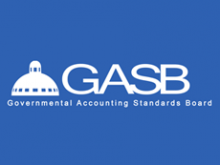
The new accounting and reporting standards issued by the Governmental Accounting Standards Board (GASB) will require that employers immediately recognize certain public pension expense items, and these changes will mean that the net pension liability and pension expense for local governments will be more volatile as investment returns over each year must be immediately recognized.
More than 100 local government managers and finance directors learned about these important new standards during an ICMA web conference, GASB Rules for Public Pensions, which took place on December 12. During the session, local government managers expressed concern that the new GASB accounting and reporting standards, which focus entirely on how state and local governments should account for pension benefit costs, will be confusing, and that GASB no longer offers guidance on how employers should calculate the annual required contribution (ARC) for public pensions.
Managers also raised questions concerning: how the new standards differ from current standards, when changes for different types of pension plans will take effect, how the changes should be explained to elected officials and the public, and how the new pension calculations may affect local government bond ratings.
Elizabeth Kellar, president and CEO of the Center for Local Government Excellence, and Paul Zorn, director of governmental research for Gabriel, Roeder, Smith & Company (a leading provider of actuarial and benefits consulting services that focuses on services to the public sector) led the audience through a detailed explanation of the GASB changes and what must be reported on local government balance sheets and new required notes.
Zorn explained that since many local governments participate in cost-sharing pension plans, the new GASB standards will require the plan sponsor to provide detailed calculations to each employer. The employer will no longer report the required contribution as the pension expense. Instead, the new GASB standards require governments to report their “proportionate share” of the plan’s collective net pension liability, pension expense, and deferred outflows of resources and deferred inflows of resources.
Because GASB no longer addresses how employers should calculate the ARC, ICMA and several national associations of local and state governments are engaged in an ongoing effort to develop policy guidance. The group recommends that a critical first step is for local governments to adopt a pension funding policy that is based on an actuarially calculated ARC and that addresses the actuarial cost method, asset smoothing, and amortization policy.
Takeaways from the webcast included
- There is time to prepare, but get started now
- Find out what new pension calculations will be reported on your balance sheet
- Adopt/update your pension funding policy; base it on an actuarially determined annual required contribution
- Have a clear communication plan in place to explain how you are funding your pension plan
- Use charts and graphs to show your assets and funding progress.
For more information about the GASB standards, visit GASB’s home page and click on "GASB Pension Project" information.
For those who missed the web conference, which 94 percent of participants surveyed said they would recommend to a colleague. you may purchase a CD or online streaming access. For more information, visit the GASB Rules for Public Pensions web conference description.
ICMA also invites you to join the Public Pension group in the Knowledge Network for updates and additional reading material. You may link to the group here.
New, Reduced Membership Dues
A new, reduced dues rate is available for CAOs/ACAOs, along with additional discounts for those in smaller communities, has been implemented. Learn more and be sure to join or renew today!
